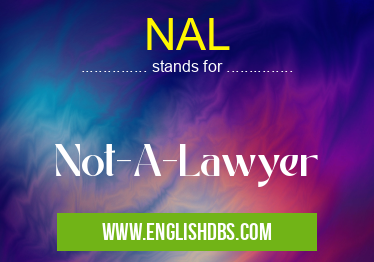What does NAL mean in LAW & LEGAL
NAL is a common abbreviation that stands for Not-A-Lawyer. It is frequently used online, particularly in legal forums and discussions, to indicate that the individual providing information is not a licensed attorney and should not be relied upon for legal advice.

NAL meaning in Law & Legal in Governmental
NAL mostly used in an acronym Law & Legal in Category Governmental that means Not-A-Lawyer
Shorthand: NAL,
Full Form: Not-A-Lawyer
For more information of "Not-A-Lawyer", see the section below.
Usage of NAL
- Online Forums: In online legal forums, users often preface their responses with "NAL" to clarify that they are not lawyers. This helps prevent confusion and ensures that users seeking legal advice understand that the information provided should not be treated as professional legal counsel.
- Disclaimer Statements: Many websites and social media accounts that discuss legal topics include a "NAL" disclaimer to inform visitors that the content provided is for informational purposes only and does not constitute legal advice.
- Personal Communications: Individuals may also use "NAL" in personal communications, such as emails or social media messages, to indicate that they are not providing legal advice and should not be held liable for any actions taken based on the information they provide.
Importance of NAL
- Legal Liability: Using NAL helps protect individuals from potential legal liability associated with providing unqualified legal advice.
- Transparency: It fosters transparency by clearly stating that the information being provided is not from a licensed attorney.
- Informed Decisions: By understanding that the information is not legal advice, users can make informed decisions about whether to seek professional assistance.
Essential Questions and Answers on Not-A-Lawyer in "GOVERNMENTAL»LAW"
What does the abbreviation "NAL" stand for?
NAL stands for "Not-A-Lawyer". It is used online to indicate that the person providing information is not a licensed attorney and should not be relied upon for legal advice.
Why is it important to consult with an attorney?
Attorneys have a deep understanding of the law and can provide personalized advice based on your specific circumstances. They can help you navigate complex legal matters, protect your rights, and ensure that your interests are represented effectively.
What are some common misconceptions about lawyers?
Some common misconceptions include:
- All lawyers are expensive.
- Lawyers are only interested in making money.
- Lawyers are not trustworthy.
- You don't need a lawyer unless you're in trouble. These misconceptions are not based in reality, and it's important to remember that lawyers are professionals who are committed to helping their clients.
What is the difference between a lawyer and a paralegal?
Lawyers are licensed professionals who have completed law school and passed the bar exam. They are authorized to practice law and provide legal advice. Paralegals are not licensed attorneys and typically work under the supervision of lawyers. They assist lawyers with various legal tasks, such as research, drafting documents, and preparing for trials.
How can I find a reputable lawyer?
There are several ways to find a reputable lawyer:
- Ask for referrals from friends, family, or colleagues.
- Contact your state or local bar association for a list of licensed attorneys.
- Use online directories such as Avvo or FindLaw.
- Attend legal aid clinics or workshops. It's important to do your research and find a lawyer who has experience in the area of law that you need assistance with.
Final Words: The abbreviation NAL serves as a valuable tool for online communities and individuals to communicate that they are not providing legal advice. By clearly indicating this status, users can avoid confusion, protect themselves from legal liability, and ensure that those seeking legal assistance understand the limitations of the information provided.
NAL also stands for: |
|
| All stands for NAL |
